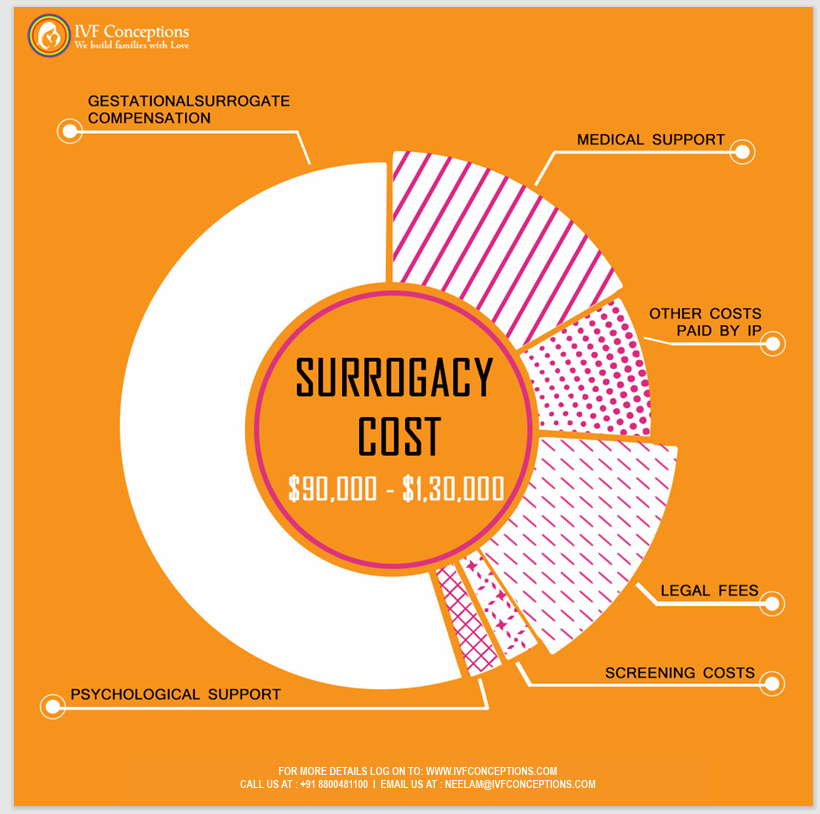How Much is Surrogate Mother Cost?

How Much is Surrogate Mother Cost | Average Surrogate Payment
How Much is Surrogate Mother Cost? The cost of hiring a surrogate varies significantly depending on location, legal requirements, and medical needs. In the US, surrogate compensation typically ranges from $35,000 to $55,000, while international surrogacy costs can be lower, between $20,000 and $30,000.
- Book an online appointment: Get a free online consultation.
- Call\W:+91-8800481100 Email:neelam@ivfconceptions.com
Many intended parents explore surrogacy when carrying a pregnancy themselves isn’t an option due to medical risks, biological limitations, or personal circumstances. Whether it’s a same-sex couple, a single parent, or those facing infertility, understanding the breakdown of surrogate costs is crucial for making an informed decision about the surrogacy journey.
Our article will walk you through insights into surrogacy especially surrogate mother cost and average surrogacy price in the US.
More Resources to Read:
Infertility Treatment and Surrogacy Process
9 Factors To Improve IVF Pregnancy Rate
International Surrogacy Options Worldwide
Surrogacy Guide for Surrogate Mothers
Who is a surrogate?
A lady who bears pregnancy for an infertile couple or single male is known as a surrogate mother or gestational carrier.
Following birth, the intended parent or parents raise the child as their own and state so on the birth certificate.
Types of surrogacy
There are two different surrogacy arrangements: traditional and gestational. The surrogate in traditional surrogacy also provides the eggs, making her genetically connected to the child.
In gestational surrogacy, the embryo is created using the intended parents’ or donors’ eggs and sperm; as a result, the surrogate is not genetically related to the kid.

Cost of surrogacy in the USA and how much a surrogate mother compensation
The cost of surrogacy in the USA is between $150,000 to $175,000. The cost of surrogacy varies from state to state and is based on several variables, including the compensation paid to the surrogate, the medical procedures, the insurance coverage, and the employment of an agency. States like California, where there is a higher demand for surrogate moms, have higher surrogacy expenses.
In this way, the average cost of surrogacy in the USA is much higher than in international surrogacy countries like Mexico, Colombia, Georgia, and Argentina, which offer less than 50% cost of surrogacy than the US cost.
The following are some factors that affect the cost of surrogacy:
- EMBRYO CREATION: The process of creating an embryo in a fertility clinic involves using the intended parents’ or donors’ sperm and eggs. $20,000 to $50,000 is the price range.
- EGG DONATION: When a woman donates her eggs, they will be used to create an embryo. between $20,000 and $30,000.
- AGENCY FEES: These are the costs of finding a surrogate and setting up a surrogacy agreement with her. range of prices: $15,000 to $30,000.
- LEGAL FEES: These are the costs associated with hiring a lawyer to draft the papers outlining the surrogate’s and intended parents’ compensation schedules and legal rights. Range of prices: $7,001 to $15,000.
- SURROGATE BASE COMPENSATION: The payment provided directly to the surrogate for bearing and giving birth to the child is known as the surrogacy base compensation (surrogate payment) $30,000 to $60,000 in the price range
- SURROGATE CONTINGENT FEES: The intended parents may be required to pay these additional costs if pregnancy-related issues such as unexpected twins or an unanticipated C-section occur. range of prices: $15,000 to $30,000
- INSURANCE COST: These are the expenses related to paying the surrogate’s health insurance plan’s premiums and deductibles while she is expecting. range of prices: $10,000 to $40,000.

How much does a surrogate get paid?
If you are thinking about becoming a parent through surrogacy, you might be curious about
A surrogate may be paid for her services in addition to being reimbursed for any medical and pregnancy-related costs.
The amount a surrogate is paid can vary depending on several variables, including the type of surrogacy, the intended parents and surrogate’s locations, the agency or attorney involved, and the surrogate’s background and preferences.
Surrogates often receive a base salary of between $30,000 and $45,000 on average. First-time surrogates typically earn less money than experienced surrogates, who can see their pay rise with each successive pregnancy.
After the fetal pulse is detected, the base compensation is often paid in monthly installments.
Surrogates may get additional compensation in addition to the base salary for the following reasons:
- transfer of embryos
- (Twins) Multiple pregnancies
- Invasive techniques (such as amniocentesis or C-section)
- Expenses for travel
- Lost wages
- Maternal attire
- Breastfeeding pumping
- Housekeeping
- Childcare
These additional payments can total anywhere from $5,000 to $15,000 or more in total. As a result, a surrogate may be paid in total in the region of $35,000 to $60,000 or more.
However, this sum might change according to the surrogacy laws and rules in other states and nations.

Cost of surrogacy with a family member or a friend
The cost of surrogacy with a family member is less than a surrogate via an agency.
There are several benefits to this kind of surrogacy, including a stronger emotional connection, a smaller chance of legal issues, and more control over the procedure.
Surrogacy with a friend or family member may be considerably less expensive than surrogacy with a stranger or through an agency.
The intended parents can save tens of thousands of dollars if the surrogate is a family member or friend, as she may only accept payment for her medical and pregnancy-related expenditures.
There are still expenses associated with surrogacy with a family member or friend, even if the surrogate receives no base payment.
These consist of the following:
- Legal fees: These are the costs associated with hiring a lawyer to create the papers outlining the surrogate’s and intended parents’ financial arrangements and legal rights.
Depending on state rules and restrictions, they cost anywhere from $7,000 to $15,000 or more.
- Medical costs: These are the costs associated with generating and transferring an embryo using IVF technology to a fertility clinic.
Depending on the number of cycles and the usage of donor eggs or sperm, they can cost anywhere between $20,000 to $50,000 or more.
- Insurance costs: These are the costs associated with paying the surrogate’s health insurance plan’s premiums and deductibles while she is expecting.
Depending on the type and quantity of coverage, they might be anywhere between $10,000 and $40,000 or more.
As a result, depending on these considerations, the overall cost of surrogacy with a family member or acquaintance might range from $35,000 to $100,000 or more.
This is still considerably less expensive than the typical surrogacy fee charged by a clinic or a stranger, which can be in the region of $100,000 to $150,000 or more.
Average compensation for surrogates across the United States
If you’re thinking about being a surrogate mother in the US, you might be curious about how much money you could get from your selfless work.
While becoming a surrogate can be a wonderful and fulfilling way to assist someone else in realizing their dream of starting a family, it also comes with many logistical, psychological, and legal difficulties.
Because of this, surrogate moms should receive just recompense for their efforts.
- Types of surrogacy: Traditional surrogates are biologically connected to the child and use their eggs. A gestational surrogate carries an embryo made from the intended parents’ or donors’ sperm and eggs. Compared to traditional surrogacy, gestational surrogacy is more popular and more expensive.
- The surrogate’s location: The fees and legislation governing surrogacy vary from state to state.
Surrogates who reside in states with high demand, such as California, can make more money than those who do.
- The surrogate’s experience: First-time surrogates may find it more difficult to secure higher compensation than surrogates who have completed past surrogacy journeys.
Experienced surrogates are aware of the procedures and requirements of surrogacy and have demonstrated their capacity to bear and deliver a healthy baby for someone else.
In the United States, a surrogate often earns $50,000 to $60,000, paid in monthly payments. She also receives an additional $5,000 to $10,000 in benefits, including the following:
- Medical costs: The intended parents or the agency offer surrogate health insurance. Additionally, they are compensated for any out-of-pocket expenses they incurred because of the pregnancy, including co-pays, prescription fees, travel charges, maternity wear, etc.
- Legal costs: Surrogates have their lawyer who represents them throughout the process and draughts and analyses the surrogacy contract to safeguard their rights and interests. The intended parents or the organization cover the cost of the attorneys.
- Psychological help: Before, during, and after the surrogacy, surrogates receive counseling and support from a qualified mental health expert.
This supports them in navigating the emotional challenges of surrogacy, such as developing a bond with the child, navigating reactions from family and friends, preparing for delivery and separation, etc.
- Undergoing a cesarean section: Surrogates who have this procedure may get an additional $3,000 or more in compensation for the added risk and recuperation period.
- Donating breast milk: Surrogates may receive an additional $250 or more per week if they want to pump and donate breast milk to the intended parents after birth.
Additional guide for intended parents:
Best surrogacy agency in India
Best surrogacy agency in Mexico
Best surrogacy agency in Colombia
Best surrogacy agency in Argentina
Best surrogacy agency in Georgia
Best surrogacy agency in the USA
Best surrogacy agency in Ukraine
Best surrogacy agency in Armenia
Conclusion
Thus, if you are considering becoming a surrogate, you should see a lawyer or a surrogacy assistant to learn more about the applicable rules and regulations as well as to obtain correct and up-to-date information regarding payment. I hope my essay has answered all of your questions about surrogacy, its several forms, and its costs.
If you’d like to learn more about IVF, Egg Donation, or surrogacy services globally, check out the rest of our website at Complete Surrogacy Agency. We offer legally secure and affordable surrogacy consulting services for FREE.
For more resources on IVF and Surrogacy, browse our other web page- IVF Conceptions.
For more resources on IVF and Surrogacy, browse our other web page- Georgia Surrogacy Agency.
Complete Surrogacy: Your Trusted Partner in International Surrogacy
At Complete Surrogacy, we have over 15 years of experience in international surrogacy, guiding 4,000+ intended parents worldwide. We provide safe, ethical, and affordable surrogacy solutions for single parents, LGBTQ+ couples, and heterosexual couples.
As members of EFS and ESHRE, we adhere to the highest ethical and professional standards. Our expert team is committed to providing accurate, compassionate, and transparent guidance, ensuring a legally secure and smooth journey to parenthood.
Let us help you build your family with trust, care, and integrity.
Get in touch for one FREE Surrogacy Consultancy!
Our team includes experts from diverse backgrounds with leading reproductive attorneys, professionally trained top fertility doctors, former surrogacy case managers, experienced and kind surrogate mother and egg donor coordinators, mental health professionals specializing in infertility counseling, and a logistic support team to assist you in your chosen surrogacy country.
References used:
FAQs Surrogate Mother Costs
Q1. What is surrogacy?
Ans. Surrogacy is a process where a woman agrees to carry and deliver a baby for an infertile couple who is unable to conceive or carry a pregnancy on their own.
Q2: How much does surrogacy cost in the United States?
Ans. Surrogacy cost in the USA is anywhere between $150,00 and $200,000 on average. The actual cost varies depending on the location and level of services needed by the commissioning parents.
Q3. How much a surrogate mother cost?
Ans. A surrogate mother in the USA gets financial benefits from $30,000 and $50,000. The amount of the flat-rate compensation varies by state. The surrogate mother cost for twins is more and may consist of an additional benefit of $10,000.
Q4. Does the price of gestational vs. traditional surrogacy affect the cost of the procedure?
Ans. Depending on the type of surrogacy, the cost can change. The expenses are typically higher in gestational surrogacy as the surrogate is carrying a child who is not genetically linked to her. Traditional surrogacy, in which the surrogate is genetically related to the child, may have cheaper medical costs but still incur other costs.
Q5. Is the cost of surrogacy with a family member or a friend affordable?
Ans. Yes, the cost of surrogacy with your acquaintance is more affordable than gestational or traditional surrogacy.

Author Bio: Neelam Chhagani is an International Surrogacy Expert with 15 years of experience in the fertility and surrogacy domain. As the founder of IVF Conceptions and Complete Surrogacy, she has guided over 4,000 intended parents worldwide on their surrogacy journey to parenthood. Recognized as a trusted authority, she specializes in holistic infertility solutions and third-party reproduction consulting.
Holding an MA in Counselling Psychology and a PGD in Mental Health, Neelam is a proud member of the European Fertility Society (EFS) and the European Society of Human Reproduction and Embryology (ESHRE). She is also a leading surrogacy blogger, providing valuable insights into ethical and practical surrogacy solutions.
Since 2010, committed to supporting ALL family types, Neelam has been passionate about helping intended parents grow their families with compassion, integrity, and a focus on secure and affordable surrogacy options Globally.
Learn more about Neelam:
https://www.ivfconceptions.com/neelam-chhagani-surrogacy-consultant/
https://www.linkedin.com/in/neelam-chhagani-92892229/















I was introduced to Neelam by a friend who worked with Neelam for surrogacy. Neelam is absolutely wonderful. I am a single male and the journey to fatherhood is not that easy. Neelam connected me to a program ideal for my circumstances. She was with me throughout the pregnancy providing advice and guidance along the way. I am so grateful I found her and am thrilled today that I have a beautiful daughter. I highly recommend Neelam to anyone who is on a journey to become a parent. Having a child has changed my world for the better. I wish others success with their own journey and recommend you connect with Neelam to find a path that is best for you.
SA (USA)